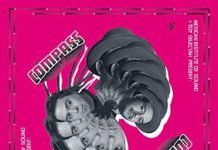Liela Moss was known until 2017 as the singer of the English rock band The Duke Spirit. This year, her solo work expanded with an album titled “Internal Working Model”.

Liela Moss recorded her third album “Internal Working Model” after the titles “My Name Is Safe In Your Mouth” from 2018 and “Who The Power” from 2020. You may also remember her from collaborations with personalities such as UNKLE, Nick Cave, Georgio Moroder, The Heritage Orchestra, Lost Horizons and others.
The new album was a pleasant surprise with a balanced repertoire and attractive guests, including the French actress, writer and musician Jehnny Beth, neo-romantic pioneer Gary Numan and the descendant of George Harrison from The Beatles Dhani Harrison.
Electronic noise
“I’m trying to find a way to plug myself into a new community,” says Liela Moss of her third solo album. “I am imagining a tribe, navigating away from our very centralised culture, dismantling it and revising the way I think things work.”
Internal Working Model bristles with frustration at our disconnected culture but also – crucially – burns with a desire to reconnect: “We see the beneficiaries of the status quo suppress realness and wellbeing by selling you a banal alternative that upholds their agenda. I want to add to the firepower to burn that old house down.”
A sense of controlled urgency emerges, fuelled by the force of Moss’ questioning insights. In part, it’s an album about selfhood and certainties unsettled in today’s dystopian theatre, somewhat by the pandemic but also, says Moss, by the “self-seeking, self-protecting culture” of global economics where we have forgotten that “competition is just a construct, co-operation is actually the natural way of being… Lyrically, I’m laughing and yelling at surveillance capitalism, I’m throwing down sentences that reach out to simply feel good on good terrain, to feel safe on planet earth. There is turbulence, but an understanding that the urge to restructure is growing; human goodness cannot truly be suppressed.”
With Moss’ expressive voice leading the way over fractious synth backdrops, the result is at once tense and tender, timeless and timely; determined to plug into positivity wherever it can be found. “It’s like a carnival of good will,” says Moss, “we see the pretence, the masquerade. Then the realness, the love. That’s why the word ‘empathy’ comes up so much and rolls around amongst the most menacing synths. It cannot be kept down, no matter the weight.”
As Liela explains of the album’s relationship to Who the Power, “I wanted a more vigorous pulse, I wanted more movement. I wanted to feel friction and for things to feel emotionally disruptive this time around.” Also at its core sits Moss’ interest in attachment theory, the idea that the ways we are cared for (or not) in childhood forge the neurological pathways that build esteem, that shape us – and perhaps the world. “I started to think about the nefarious characters in globalist culture who have such a hold on what’s going on in terms of big pharma, big tech and big political everything. I was thinking, my God, these manipulative people started life needing to be attended to properly and probably were not! All this desperate greed and corruption winds back to maladapted individuals! Then I began seeing them as tiny, neglected humans with an unhealthy attachment cycle.”
Challenging times
The track ‘Ache in the Middle’ features guest vocals from Jehnny Beth. Feeling like the song wasn’t quite complete, Moss had offered it to Beth’s partner Johnny Hostile to develop instrumentally. “He asked for the lyrics, which was unexpected as I don’t think I’ve heard him sing. Then he said, “Jehnny heard it, she thought it was cool and decided to sing on it. If you don’t like it, she doesn’t mind if you don’t want to keep it, but she’s done this. What do you think?’ I was like, are you crazy? This is brilliant, this is an absolute gift. It’s one of those rare things where you get more than you expected. That doesn’t happen often, does it?”
Another guest appearance comes on the track ‘Love As Hard As You Can’ which features Dhani Harrison on a cathartic reflection on the “simple shit” one might do to feel better. “Love your friends,” says Moss. “Look after your neighbours. Listen to different points of view. Calm the anger. Be less grasping. Give things away when it’s easy to do so, and don’t worry about it. That’s sort of it, in the end.”
Internal Working Model’s creation evolved organically between Moss and partner/collaborator Toby Butler, who divided their time between work and parenting to make the album. Moss compares the process to a “slow game of cards,” the duo revealing their hands in a playful spirit. The “third brain in the room,” says Moss, was the modular synth: “You tweak it and it changes the energy. There’s nothing new in that technology, but in terms of the way we’ve worked for years, working with an anonymous synth brain was a new kind of freedom.”
In earlier years, Moss’ environs have included The Duke Spirit, the guitar band whose output ranged from brawling alt-rock to more cinematic ventures. Other outlets have included synth-rock project (with Butler) Roman Remains and various collaborative ventures – with UNKLE, Nick Cave, Giorgio Moroder, The Heritage Orchestra and Lost Horizons, among others. She also served as muse for fashion icons Alexander McQueen and Phillip Lim. That combination of self-possession, exploration and receptivity drives Internal Working Model. Personal and expansive, galvanic and inquisitive, it’s an album that sees the modern world’s mess through open eyes but isn’t willing to stop there: it wants to seek out solutions, source the potential in other ways of being and seeing.
NMR (foto: press Liela Moss)


















